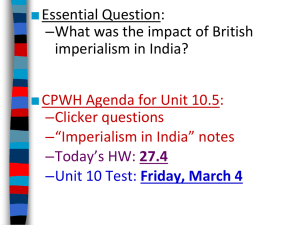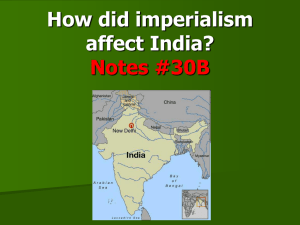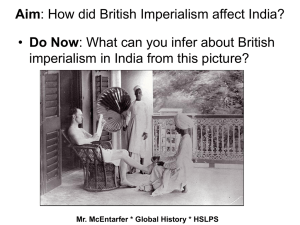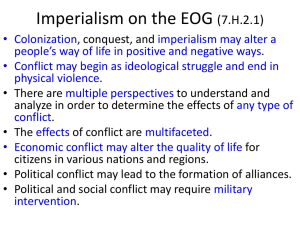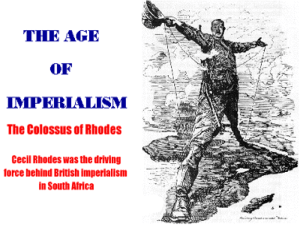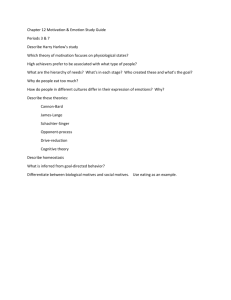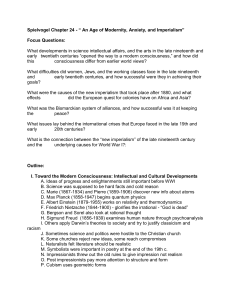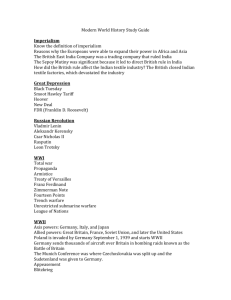Imperialism Study Guide
advertisement
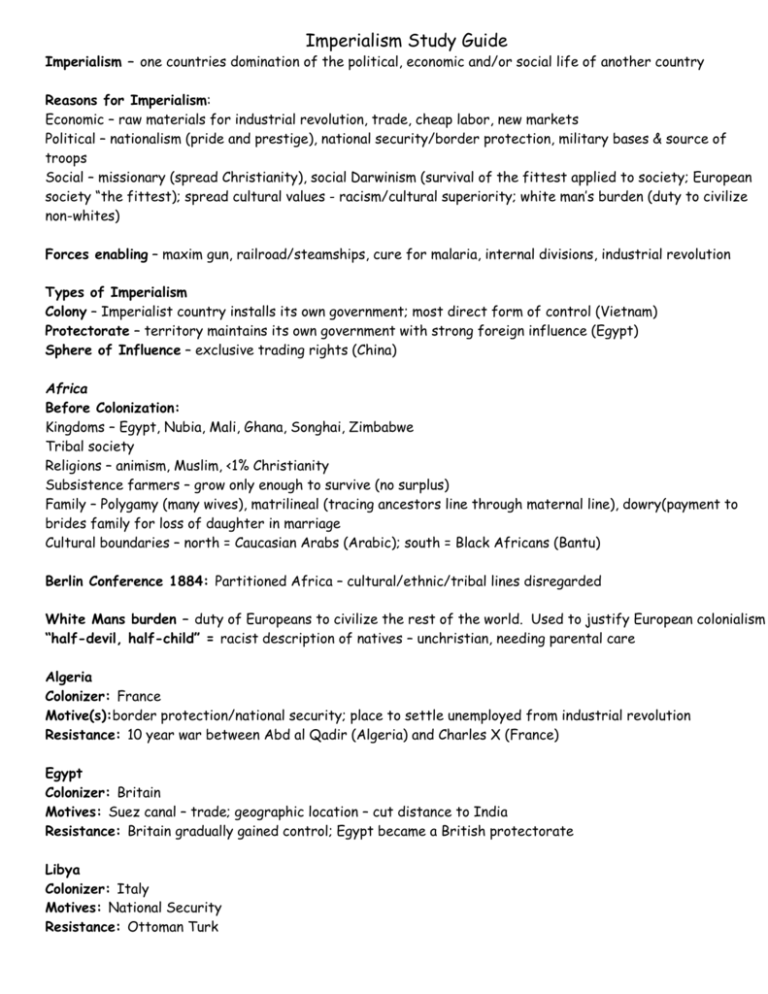
Imperialism Study Guide Imperialism – one countries domination of the political, economic and/or social life of another country Reasons for Imperialism: Economic – raw materials for industrial revolution, trade, cheap labor, new markets Political – nationalism (pride and prestige), national security/border protection, military bases & source of troops Social – missionary (spread Christianity), social Darwinism (survival of the fittest applied to society; European society “the fittest); spread cultural values - racism/cultural superiority; white man’s burden (duty to civilize non-whites) Forces enabling – maxim gun, railroad/steamships, cure for malaria, internal divisions, industrial revolution Types of Imperialism Colony – Imperialist country installs its own government; most direct form of control (Vietnam) Protectorate – territory maintains its own government with strong foreign influence (Egypt) Sphere of Influence – exclusive trading rights (China) Africa Before Colonization: Kingdoms – Egypt, Nubia, Mali, Ghana, Songhai, Zimbabwe Tribal society Religions – animism, Muslim, <1% Christianity Subsistence farmers – grow only enough to survive (no surplus) Family – Polygamy (many wives), matrilineal (tracing ancestors line through maternal line), dowry(payment to brides family for loss of daughter in marriage Cultural boundaries – north = Caucasian Arabs (Arabic); south = Black Africans (Bantu) Berlin Conference 1884: Partitioned Africa – cultural/ethnic/tribal lines disregarded White Mans burden – duty of Europeans to civilize the rest of the world. Used to justify European colonialism “half-devil, half-child” = racist description of natives – unchristian, needing parental care Algeria Colonizer: France Motive(s):border protection/national security; place to settle unemployed from industrial revolution Resistance: 10 year war between Abd al Qadir (Algeria) and Charles X (France) Egypt Colonizer: Britain Motives: Suez canal – trade; geographic location – cut distance to India Resistance: Britain gradually gained control; Egypt became a British protectorate Libya Colonizer: Italy Motives: National Security Resistance: Ottoman Turk Congo Colonizer: King Leopold II/ Belgium Motives: Natural resources (rubber, ivory), cheap labor Effects: stripped land of natural resources (rubber trees, elephants), caused thousands of deaths due to brutality South Africa Colonizer(s) Dutch Afrikaners/Boers; Britain Motives: economic – gold, diamonds Major Events: Boer War: British and Dutch fight for control of South Africa; British win Apartheid – strict system of racial segregation and discrimination in South Africa against black South Africans South African National Congress/African National Congress – created by black South Africans to end racial discrimination in South Africa and bring all Africans together. Nelson Mandela led the ANC and spent 27 years in prison until becoming the first elected President of a democratic South Africa. Liberia Colonizer: None – remains independent *Settled by: African Americans Ethiopia: Colonizer: Italy tried but failed – remains independent Resistance: Emperor Menelik II led resistance against Italy which ended Italy’s conquest of Ethiopia until after his death Reasons for Resistance: Natives felt they were being used as forced labor to help European economy Resented intrusion of Western cultures and religions Desired control of own destiny Effectives of Imperialism in Africa: Positives: Modern technology Modern medicine Schools Development of infrastructure – roads, ports, railroads (used to transport raw materials to Europe) Negatives: Decline in traditional culture with increased European influence Ethnic & tribal lines disregarded causing long-term warfare Slave Trade effected African economy by depleting able bodied labor source Natural resources depleted Natives forced to work for low wages under harsh conditions India Before Colonization: Muslim and Hindu religions Strong traditional culture (Caste system, belief in reincarnation) Subsistence farmers Colonizer: Britain Motives: Trade, natural resource (pepper, cinnamon, opium, indigo, cotton, textiles (muslin, calico), social cultural superiority and missionary Major Events: East India Company – Rich, powerful trading company set up trading posts and ports in India. Created a monopoly on Indian trade. Expanded control in India through wars and commercial activity. Gradually controlledmilitary and government functions. Sepoy Rebellion – Indian soldiers (Sepoy) rebel against British East India Company who imposed Christianity and European customs on them. Massacres on both sides lead British Parliament to end East India Company’s control. British vicory (British representative to rule). Indian Nationalism – movement by Indians to gain more control and eventually independence from Britain Indian National Congress – Indian business and professional leaders who are upset about food shortages, discrimination and other problems. Goals: democracy, equality, self-rule. Mahatma Gandhi – major political and spiritual leader of the Indian independence movement. Advocated non-violent means to end discrimination and British control of India Congress Party – uses military (violent) approach to gain independence Effects of Imperialism Positive: Infrastructure – roads, railroads, telegraph cables, canals – used to transport raw materials out of Idian Tried to eliminate some perceived problems of Indian culture – child brides, caste system, burning alive of widows Universities and schools Medical and technology advances Negative: Discrimination Increased influence of European customs and religious practices Forced labor Setback economic progress – still one of the poorest countries in the world Australia Colonizer: Britain (Penal colony – for prisoners) Aborigines: Native Australians pushed from coastline to internal Australia (outback) New Zealand Colonizer: Britain Maori: Native New Zealanders (problems still exist today over land rights between the Maori and Europeans) China Before Imperialism: Ming and Qing Dynasties – hereditary rulers 1500s – superior culture Limited trade with Europe European goods considered inferior Corruption, weakened military, internal rebellion lead to decline Confucianism – moral and ethical teachings of Confucius that became the basis for Chinese education Colonizer(s) Britain Later – France, Germany, Japan & Russia , along with Britain set up spheres of influence Motives: Trade, missionary Major Events: Opium Wars – (1839-1842) and (1856 -1860) – British win British want: To break the trade barrier and to avoid cash payments of goods British smuggled Opium (highly addictive drug from India) Chinese want: To end destruction to Chinese society caused by Opium which is weakening the country Treaty of Nanking – 1st unequal treaty between China and Europeans Hong Kong – Chinese give up to Britain. Signed a 99 year lease (1898-1997) Extraterritoriality – Right to live in China under British laws and courts Spheres of Influence – Areas of exclusive trading rights Open Door Policy – Equal trading rights U.S. – wanted open door policy because were late to imperialize and did not get a sphere of influence Sino-Japanese War – (1894-1895) War between China and Japan Symbolized Chinese weakness from Qing Dynasty and Opium wars and Japanese strength from modernization Chinese lost Taiwan and ended Chinese influence in Korea Boxer Rebellion – internal Chinese rebellion against foreign influence (similar to Sepoy Rebellion in India) Guang Xu – wanted to reform China and bring western ideas into China to strengthen it Ci Xi – mother of Guang Xu; imprisoned Guang Xu and reversed reforms. Wanted no western influence Nationalist Revolution (1911-1912) Ends dynastic rule in China Sun Yat-sen – doctor who led revolution against dynastic rule o Goals: Nationalism Democracy Economic Prosperity Japan Before Imperialism Emperor – “God-like” religious and political leader with little power Shogun – military leader Tokugawa Shogunate – combination of central government and feudalism Trade – uninterested in European products, cut off almost all trade with Europe European Motives: Trade Japanese Motives: Raw materials, living space, nationalism Major Events: Matthew Perry – U.S. Commodore sent by Pres. Fillmore demanding trade with Japan. Power of weapons convinced Japan to sign treaty. Perry returned one year later and Japan agreed to all of U.S. demand Unfair Treaties Shogun sign treaties with GB, FR, Holland, Russia and US Shogun overthrown in 1868 due to unhappiness over “unfair treaties” Meiji Restoration – Emperor returns to rule in centralized form of government Mutsuhito – “Enlightened Emperor” ; 1st of Meiji rulers Tried to make Japan a great power by strengthening Japan politically, economically & militarily o Parliamentary government o Strengthened military o Industrialization o Universal Education Industrialization – modernized industry; began own industrial revolution No loans from west – feared foreign takeover if defaulted Infrastructure – postal & telegraph networks, railroads, port facilities Modern Currency – coins and paper money Growing population – provided cheap labor Japanese Expansion: Sino-Japanese War – Japan begins own imperialism focus on Korea (see China section) Russo-Japanese War – Conflict between Russia and Japan over control of Korean peninsula and Manchuria. Japan wins American Imperialism Manifest Destiny – term used to explain continental expansion by the United States. Gave the US a sense of national destiny or purpose, and justification to expand its borders and push into territory it did not control. A belief that North America should be under the control of Americans. Monroe Doctrine – Warned European powers not to interfere in countries in Western Hemisphere 2 major points: 1. American continents can’t be colonized 2. US would prevent any attempt at colonization Spanish American War – war over Cuban independence from Spain Jose Marti – led Cubans in a revolution against Spanish rule U.S. motives – wanted Spanish out of western hemisphere and remaining overseas colonies “Remember the Maine” – 266 American’s died on board the Battleship Maine in the port of Havana – U.S. declared war on Spain (believed to have caused the explosion) U.S. Territorial gains from Spanish American War: Philippines, Guam, Puerto Rico Panama Canal Motives: 1. Trade 2. National security – needed to be able to quickly move US navy between Pacific and Atlantic ocean Mexican American War – cause was the US annexation of Texas Motives: U.S. expansion in West Results: California, New Mexico, Arizona, Utah, Nevada

